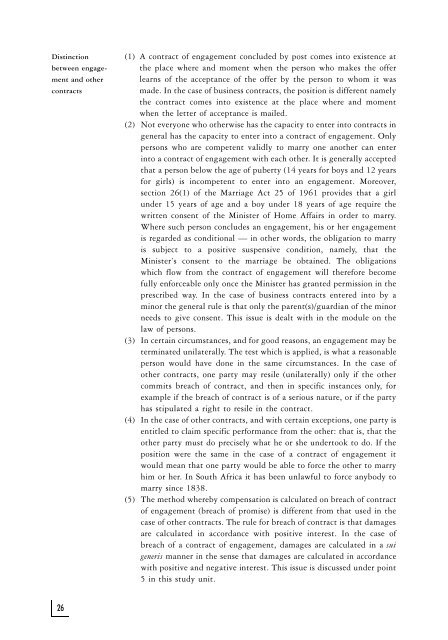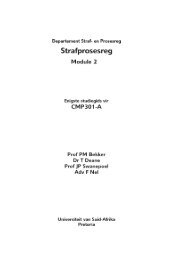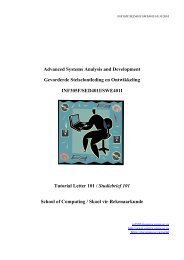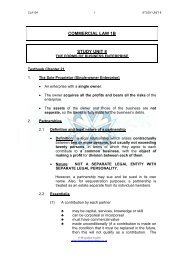key to the study guide - Name
key to the study guide - Name
key to the study guide - Name
You also want an ePaper? Increase the reach of your titles
YUMPU automatically turns print PDFs into web optimized ePapers that Google loves.
Distinction<br />
between engagement<br />
and o<strong>the</strong>r<br />
contracts<br />
26<br />
(1) A contract of engagement concluded by post comes in<strong>to</strong> existence at<br />
<strong>the</strong>placewhereandmomentwhen<strong>the</strong>personwhomakes<strong>the</strong>offer<br />
learns of <strong>the</strong> acceptance of <strong>the</strong> offer by <strong>the</strong> person <strong>to</strong> whom it was<br />
made. In <strong>the</strong> case of business contracts, <strong>the</strong> position is different namely<br />
<strong>the</strong> contract comes in<strong>to</strong> existence at <strong>the</strong> place where and moment<br />
when <strong>the</strong> letter of acceptance is mailed.<br />
(2) Not everyone who o<strong>the</strong>rwise has <strong>the</strong> capacity <strong>to</strong> enter in<strong>to</strong> contracts in<br />
general has <strong>the</strong> capacity <strong>to</strong> enter in<strong>to</strong> a contract of engagement. Only<br />
persons who are competent validly <strong>to</strong> marry one ano<strong>the</strong>r can enter<br />
in<strong>to</strong> a contract of engagement with each o<strong>the</strong>r. It is generally accepted<br />
that a person below <strong>the</strong> age of puberty (14 years for boys and 12 years<br />
for girls) is incompetent <strong>to</strong> enter in<strong>to</strong> an engagement. Moreover,<br />
section 26(1) of <strong>the</strong> Marriage Act 25 of 1961 provides that a girl<br />
under 15 years of age and a boy under 18 years of age require <strong>the</strong><br />
written consent of <strong>the</strong> Minister of Home Affairs in order <strong>to</strong> marry.<br />
Where such person concludes an engagement, his or her engagement<br />
is regarded as conditional Ð in o<strong>the</strong>r words, <strong>the</strong> obligation <strong>to</strong> marry<br />
is subject <strong>to</strong> a positive suspensive condition, namely, that <strong>the</strong><br />
Minister's consent <strong>to</strong> <strong>the</strong> marriage be obtained. The obligations<br />
which flow from <strong>the</strong> contract of engagement will <strong>the</strong>refore become<br />
fully enforceable only once <strong>the</strong> Minister has granted permission in <strong>the</strong><br />
prescribed way. In <strong>the</strong> case of business contracts entered in<strong>to</strong> by a<br />
minor <strong>the</strong> general rule is that only <strong>the</strong> parent(s)/guardian of <strong>the</strong> minor<br />
needs <strong>to</strong> give consent. This issue is dealt with in <strong>the</strong> module on <strong>the</strong><br />
law of persons.<br />
(3) In certain circumstances, and for good reasons, an engagement may be<br />
terminated unilaterally. The test which is applied, is what a reasonable<br />
personwouldhavedonein<strong>the</strong>samecircumstances.In<strong>the</strong>caseof<br />
o<strong>the</strong>r contracts, one party may resile (unilaterally) only if <strong>the</strong> o<strong>the</strong>r<br />
commits breach of contract, and <strong>the</strong>n in specific instances only, for<br />
example if <strong>the</strong> breach of contract is of a serious nature, or if <strong>the</strong> party<br />
has stipulated a right <strong>to</strong> resile in <strong>the</strong> contract.<br />
(4) In <strong>the</strong> case of o<strong>the</strong>r contracts, and with certain exceptions, one party is<br />
entitled <strong>to</strong> claim specific performance from <strong>the</strong> o<strong>the</strong>r: that is, that <strong>the</strong><br />
o<strong>the</strong>r party must do precisely what he or she under<strong>to</strong>ok <strong>to</strong> do. If <strong>the</strong><br />
position were <strong>the</strong> same in <strong>the</strong> case of a contract of engagement it<br />
would mean that one party would be able <strong>to</strong> force <strong>the</strong> o<strong>the</strong>r <strong>to</strong> marry<br />
him or her. In South Africa it has been unlawful <strong>to</strong> force anybody <strong>to</strong><br />
marry since 1838.<br />
(5) The method whereby compensation is calculated on breach of contract<br />
of engagement (breach of promise) is different from that used in <strong>the</strong><br />
case of o<strong>the</strong>r contracts. The rule for breach of contract is that damages<br />
are calculated in accordance with positive interest. In <strong>the</strong> case of<br />
breach of a contract of engagement, damages are calculated in a sui<br />
generis manner in <strong>the</strong> sense that damages are calculated in accordance<br />
with positive and negative interest. This issue is discussed under point<br />
5inthis<strong>study</strong>unit.












